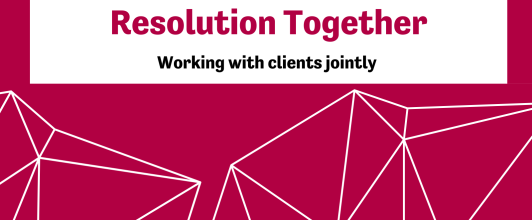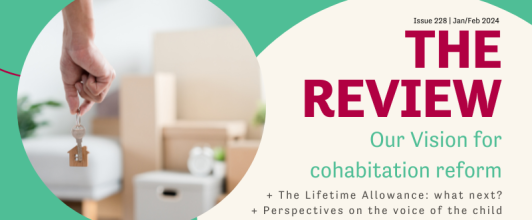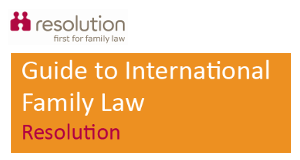
Resolution Together
Resolution Together is a way of working that allows lawyers to work with and advise couples jointly, including providing appropriate legal advice, through a divorce or separation.
Broad range of information for professionals and practitioners in family law and justice.
Showing 81 - 100 of 501

Resolution Together is a way of working that allows lawyers to work with and advise couples jointly, including providing appropriate legal advice, through a divorce or separation.
As part of Resolution's Code of Practice members are asked to use the Good Practice Guides as part of their day to day work. These represent Resolution's core values and are designed to offer knowledge and guidance to our members.

The Review is Resolution's bi-monthly magazine for members. Publishing six times a year with a mix of features, law and practice and news from the regions.

Find resources on mediation, collaborative practice, arbitration and more.

As with most areas of contentious law, having to instruct a criminal or family lawyer is seldom a happy process for the client. Unfortunately, the nature of relationship breakdown means that all too often family proceedings result in the need for criminal advice.

Family courts in England and Wales are increasingly dealing with international family law cases – much more so than even just a few years ago – indeed there is every likelihood that Brexit will increase the amount of litigation in England and Wales.
The famous fable as you know it, but where both reach the finishing line together, in their own way.
What hair testing can – and can’t - tell us about a person’s drug and alcohol use .
The case of Hussain v Parveen (Queen's Proctor intervening) highlights the points to be considered in terms of recognition of foreign divorces – and opens up a number of wider issues about Islamic divorces generally.
In Re X (A child acting by her Children’s Guardian) v Y (Restraining abuse of Children’s Guardian) and Z, Mr Justice MacDonald had to weigh up the competing principles of freedom of speech and respect for private and family life. This involved using “the ultimate balance test”.
Black History Month helps make role models visible, so others can believe that there is room for them.
A recent series of cases suggests there is a new imperative for out-of-court resolution in Schedule 1 cases.
In Azarmi-Movafagh v Bassiri-Dezfouli the Court of Appeal reinstated a lump sum towards the husband’s legal costs to avoid depleting housing fund.
Seven years have passed since Mostyn J said it was time to “actually do something” about disproportionate costs…
LawCare has released findings showing legal professionals at high risk of burnout, with 69% having experienced mental ill-health, and one in five bullied, harassed or discriminated against at work.
A combination of circumstances and pressures led one family lawyer to shift over entirely to mediation. So how has it worked out?
Just as Resolution was surveying members on the future of family practice, Irwin Mitchell asked 1,000 divorcees about their experiences. Both surveys pointed rather dramatically in the direction of non-court dispute resolution processes…
The essence of good Resolution family practice is to assist people through their family dispute in a way that best serves their personal and family interests, especially if there are children involved.
Diwali or Deepawali (latter meaning “row of lighted lamps in Sanskrit) is one of the major festivals celebrated by Hindus, Jains and Sikhs (Bandi Chhor Divas) and Newar Buddhists. Each have their differing beliefs, rituals and regionally across India, the worship of different deities to mark the occasion. It is one of the social festivals of India that has an array of other national and dharmic festivals for celebration.
We hope the Innovation Group’s Modern Work survey will give members an opportunity to pick up ideas or learn from the changes others are making, and also identify areas and ways of working which they may prefer to focus on.
Cohabiting couples currently have little legal protection when they separate. A legal framework of rights and responsibilities when couples (not married or civil partnered) who live together split up is needed to provide some legal protection and secure fair outcomes at the time of a couple’s separation.
For every issue of The Review we will be publishing the articles here in the Knowledge and Resources section of our website as well as the pdf of the printed version.
The Review catches up with… Cris McCurley of Ben Hoare Bell, who won the Family Award at this year’s Legal Aid Lawyer of the Year Awards, which Resolution was proud to sponsor. Cris is an expert in forced marriage, honour-based violence and FGM cases, and is described as the “go-to” solicitor for multiple charities supporting victims of domestic abuse. Resolution would also like to commend the runners up: Novlet Levy and Oliver Conway.
Mediators clearly have a great deal of influence over the structure and conduct of the negotiation process. So what happens if they get it wrong?
The rules around pension sharing orders are complex and fraught with risk…
AEOs can be powerful tools to ensure payment so maintenance, but the exact rules are rigid and need to be followed carefully.